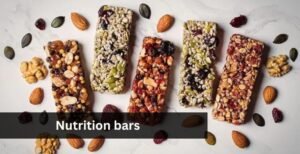The increasing focus on health and wellbeing has led to a notable increase in the demand for nutrition bars in recent years. Nutrition bars are becoming a popular option as people look for quick, wholesome meals to go. In this piece, we examine the contract development landscape for nutrition bars, including the function of contract manufacturers, market dynamics, and issues to take into account for companies considering entering this exciting and rapidly evolving sector.
The Growth of Contract Manufacturing and Nutrition Bars
Comprehending the Nutrition Bar Industry
The market for nutrition bars has grown dramatically as a result of shifting customer preferences, rising health consciousness, and the need for quick and wholesome snack options. Nutrition bars have become a popular option for people looking for a satisfying snack or a rapid energy boost because they are frequently enhanced with proteins, fibers, vitamins, and minerals.
The Role of Contract Manufacturers
Many firms outsource Nutrition bars contract manufacturers to keep up with the increasing demand while maintaining product quality. Contract manufacturers of nutrition bars are specialized businesses that have the resources and know-how to manage every facet of production, from developing recipes to packaging. By working together, businesses can concentrate on marketing, branding, and distribution, knowing that their specialized partners’ manufacturing competence will take care of the manufacturing.
Factors Affecting the Situation of Nutrition Bar Contract Manufacturing
1. Diverse Formulations to Meet Customer Needs
Contract manufacturers are essential in meeting customers’ various dietary needs and preferences. To satisfy consumer demand, makers of bars for various dietary restrictions, such as gluten-free, vegan, or energy/protein bars, need to be adaptable in their formulas.
2. Sourcing of Ingredients and Quality
The caliber of components utilized in the creation of nutrition bars has a significant impact on their reputation. To guarantee the nutritional integrity of the bars, contract makers must give top priority to locating ingredients that are clean, recognizable, and of the highest quality. Working together with dependable suppliers is essential to upholding consistency and satisfying the demands of health-conscious customers.
3. Novel Flavours and Textures
The market for nutrition bars is always driven by novel flavors and textures. To satisfy customers’ palates and offer a range of flavor profiles and textures that are both aesthetically pleasing and pleasurable to eat, contract manufacturers must stay up to date with consumer trends and preferences. Texture diversity is essential, ranging from chewy protein bars to crunchy granola bars.
4. Health and Wellness Trends
Nutrition bars are just one example of how the food sector has been impacted by the wellness movement. To improve the nutritional profile of bars, contract manufacturers need to incorporate functional ingredients, superfoods, and adaptogens in line with current health trends. Important factors to take into account are label transparency and compliance with health and wellness certifications.
5. Customization and Private Labeling
To stand out from the competition, contract manufacturers are providing brands with more and more customization choices. This involves the capacity to develop original formulas, customize nutritional profiles, and design packaging that complements a brand’s image. Another well-liked choice for companies looking for a speedier path to the market is private labeling, which involves attaching a brand’s emblem to a product that has already been created.
Things to Think About When Businesses Consider Developing a Contract for Nutrition Bars:
1. Well-defined goals and market analysis
Before diving into nutrition bar contract development, companies need to have well-defined goals. Finding target demographics, comprehending market trends, and evaluating the competitive environment are all aided by conducting thorough market research. Important choices about formulation, branding, and market positioning are influenced by this knowledge.
2. Regulatory Compliance and Certifications
The food and beverage business is subject to strict rules to guarantee product safety and compliance. Companies are required to collaborate with contract manufacturers who follow these guidelines and hold the necessary certifications, such as organic certifications, Hazard Analysis and Critical Control Points (HACCP), and Good Manufacturing Practices (GMP), depending on the type of product.
3. Transparency and Communication
Brands and contract manufacturers must communicate openly and honestly. For cooperation to be effective, there must be clear communication about expectations, quality standards, and deadlines. Feedback loops and frequent updates help ensure a smooth development process.
Also read: Global vs. Local: The Battle Between Breakfast Cereal Companies
4. Testing and Quality Assurance
When producing nutrition bars, quality assurance is a must. Strong quality control procedures, such as ingredient and product testing and adherence to industry standards, should be in place at contract manufacturers. When these processes are transparently documented, brands can feel confident in the quality of the final product.
5. Scalability and Flexibility
A brand’s products may see a surge in demand as it expands. It should be possible for contract manufacturers to adjust output levels appropriately. Scalability is essential for allowing for growth without sacrificing the caliber of the final result. Furthermore, production flexibility enables the addition of new formulations or modifications based on input from the market.
6. Cost Agreements and Considerations
The cost of any company endeavor is an important consideration. Brands should carefully evaluate the cost structure offered by contract manufacturers, taking into account the complexity of manufacturing, strength of ingredients, and packaging required. A clear and mutually productive collaboration requires well-defined contractual agreements that specify roles, deadlines, and pricing.
Wrapping Up
The contract manufacturing environment for nutrition bars provides a flexible and adaptable option for companies wishing to join or grow in this rapidly growing sector. The nutrition bar sector is significantly shaped by contract manufacturers, who prioritize varied formulations, superior sourcing, creativity, and adaptability. A successful and long-lasting relationship will depend on firms taking this route carefully, weighing their goals, communication, regulatory compliance, quality assurance, scalability, and cost considerations. The next wave of innovation in the nutrition bar market is expected to be driven by brand-contract manufacturer collaboration as customer preferences continue to change.
